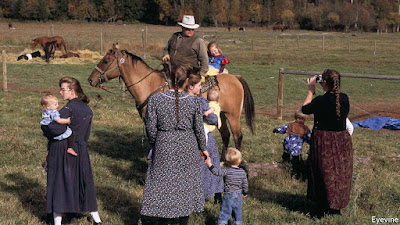Polygamy Makes Sense—But Not in Heaven
Polygamy Makes Sense… Until You Start Talking About Heaven
Polygamy has existed throughout history—and in many contexts, it makes sense.
In times and places where mortality rates were high—especially among women due to childbirth—polygamy was a survival strategy. One man can biologically impregnate hundreds of women a year. One woman can typically bear one child per year. So if you’re trying to repopulate a community devastated by war, famine, or plague, polygamy is a functional tool.
Historically, pregnancy and related complications were the leading cause of death for women. In parts of the world where medical care is still limited, the maternal death rate remains dangerously high. In those cases, a single male with multiple partners could help restore numbers quickly, especially in tribal, nomadic, or post-apocalyptic societies.
Beyond survival, polygamy has also been used for political or religious expansion. If one man fathers hundreds of loyal children in a generation or two, that small group can quickly gain cultural influence and numbers. Multiply that over three or four generations, and you’ve built an army of loyalists.
So yes—on a physical, biological, and even strategic level—polygamy has had its place.
But what about heaven?
When Heaven Sounds Like a Harem
Let’s talk about the version of heaven I’ve heard all my life:
A man’s eternal reward is a kingdom filled with women—hundreds, maybe thousands—at his side.
But I’ve never heard that a woman’s reward is a paradise of attentive, doting men.
Never once have I been told that I’d have a celestial lineup of soul-partners ready to serve me in heaven.
If heaven isn’t bound by biology, then why would polygamy still be necessary? There’s no need to repopulate. And if pregnancy exists in the afterlife, I doubt it follows the same 9-month incubation period or painful labor. So why would many women still be required for one man’s fulfillment?
The idea that “heaven = harem” raises bigger questions.
Is this concept of celestial polygamy rooted in divine truth—or in centuries of human ego?
Power, Politics, and Bloodlines
Let’s zoom out.
For millennia, kings and elites have used polygamy to build alliances, cement control, and blur bloodlines. Taking wives, concubines, and mistresses from opposing kingdoms was a calculated move—not just lust, but leverage.
Could this same idea—this dream of endless women—have been passed down to the everyday man as a kind of pacifier?
“Obey now, and you’ll have your reward later.”
Is it possible that generations of men were taught to accept subservience to those in power by being promised a heaven where they’d be the king someday?
As a Woman, That Doesn’t Sound Like Heaven
As a woman, this idea of heaven doesn’t sit right with me.
That I could spend my entire mortal life trying to be “righteous,” only to become one of many angelic assistants to a glorified male soul?
That my highest reward would be walking streets of gold, endlessly supporting a man’s eternal progression?
That doesn’t feel like heaven. That feels like more of the same hierarchy we’ve been fed on Earth.
A true heaven would be a place of soul sovereignty.
A place where every being is valued, not ranked.
Where partnerships are chosen, not required.
Where salvation is not tethered to a spouse’s worthiness—but to one’s own soul journey.
I’ve been told that “free agency” is the first law of the universe. If that’s true, then love and eternity should also be rooted in free choice—not obedience or gender roles.
Polygamy Has Purpose—But It Isn’t Divine Doctrine
Yes, polygamy can make sense in this physical world.
But that doesn’t mean it mirrors the divine.
Just because something is logical in survival mode doesn’t mean it’s sacred in a spiritual one.
No one actually knows what heaven looks like.
So to teach that polygamy is required to get there? That’s not truth.
That’s conjecture.
When consenting adults choose polyamory or polygamy in this life, that’s their business. That’s agency. But when people are taught that only one relationship model is righteous, and that heaven requires it, that becomes propaganda.
And we must ask: Who benefits from that belief?
Ask Yourself What’s True—for You
In the end, this conversation isn’t really about polygamy.
It’s about freedom.
It’s about questioning the narratives we’ve inherited.
It’s about asking ourselves what actually aligns with our soul—and what was passed down to keep us in line.
Truth is personal.
Truth is what works for your life, your heart, your spirit.
So no matter what anyone teaches you about heaven, relationships, or worthiness—
you get to choose what’s true for you.
And that’s the real reward.





Comments
Post a Comment